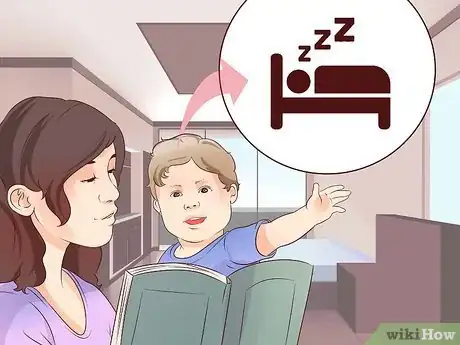This article was co-authored by Wits End Parenting. Wits End Parenting is a parent-coaching practice based in Berkeley, California specializing in strong-willed, “spirited” children with impulsivity, emotional volatility, difficulty “listening,” defiance, and aggression. Wits End Parenting's counselors incorporate positive discipline that is tailored to each child’s temperament while also providing long-term results, freeing parents from the need to continually re-invent their discipline strategies.
There are 14 references cited in this article, which can be found at the bottom of the page.
This article has been viewed 79,619 times.
Children seem to enjoy life much more than adults, but that doesn't mean it's all fun and games. Kids can get sad sometimes, and as a parent or guardian it's your job to figure out what's wrong and help your child feel better. Start by talking about his problems, then work out ways to cheer him up with both short-term and long-term solutions.
Steps
Starting a Dialogue With Your Child
-
1Ask him about his problems. If your child is sad, you're probably feeling concerned. Sad children may cry, pout, act disengaged, or generally act abnormal, which can be very alarming to a parent. There are many reasons why your child might be sad, so start by asking your child about what's bothering him.
- Don't shy away from talking about troubling situations. If there's a death, divorce, or separation in the family, acknowledge it and answer any questions your child might have.[1]
- Some children have a hard time putting their feelings into words. Be patient, and keep asking until you get a sense of what's wrong.
- If your child doesn't know how to talk about what's wrong, use a game of 20-questions (with "warmer" or "colder" responses) to narrow down what's bothering him.[2]
- If you suspect you know why your child is sad, ask prompting questions to get him to talk about it. For example, you might say something like, "It sounds like you're sad that Timmy moved away," or "I bet it hurt your feelings when Billy wouldn't sit with you."[3]
-
2Don't downplay how he's feeling. If your child is experiencing something troubling, it's important to make him feel that his emotions are being validated. This starts with how you initiate conversations with your child and carries through to how you respond when he tells you what's wrong.
- Let your child talk about whatever is bothering him. Even if it's something that's difficult for you to tell him about, it's important that you listen and respond honestly and affectionately.[4]
- Never tell a child (or anyone, for that matter) to "snap out of it," "cheer up," or "pull yourself together." Saying these things can send a message to your child that his feelings don't matter.[5]
- Similarly, never tell your child that his situation "isn't so bad" - that may be true from your adult perspective, but to your child, feeling abandoned by his friend at lunch could be a crushing loss.
- Recognize that many sad children also experience coexisting emotions, like anger or fear. Be patient and try to talk your child down if he's feeling scared or mad at someone.
Advertisement -
3Talk about your own sad feelings. Some children may not recognize that their parents get sad from time to time. Many parents try to hide their own negative emotions to protect their children - which is healthy to do sometimes, but not to the point that your child thinks you never feel sad.[6]
- Showing or talking about your own sadness can help your child realize that he isn't alone, and that it's okay to feel sad sometimes.[7]
- Tell your child that it's okay to cry, and don't be afraid to cry in front of him sometimes. Shield him or move him away from other kids so that no one calls him a "crybaby."
- Talk about times when you've been sad, and let your child know that you cry sometimes too.
Cheering Up Your Child in the Short Term
-
1Play together. If your child is feeling sad, try playing with him. It will remind him that you love and care about him, and it might help take his mind off his problems.[8]
- If your child still plays with toys, then join him in playing with his favorites. If he's moved on to video games, try joining him for a few levels.
- Make sure your child has access to toys/activities that engage the senses. Some experts have found that playing with tactile materials, like clay, play dough, sand, rice, and even water can help sad children work through their emotions.[9]
-
2Take an interest in things he likes. Depending on your child's age, gender, and personality, he or she may be interested in a number of things. No matter what your child is interested in, try engaging with him in that interest. It will help him connect with you, and it might open the door to deeper, more meaningful conversations about other aspects of his life.[10] [11]
- If your kid likes comics, ask him about his favorites, or ask if you can borrow one of the comics he likes the most.
- If your child is interested in cartoons or TV shows, ask if you can watch with him. This can give you a better idea of his sense of humor at his current age, which might make it easier to cheer him up when he's sad.
- If your child is into sports, watch a game with him, or buy tickets to catch a game in your hometown.
- No matter what your child is interested in, you should develop some degree of interest in those things too. It will help you bond, and you'll know how to engage with him the next time he's feeling down.
-
3Let your child act out his problems. This may not interest all children, but many kids want to act out or play pretend with issues they're interested in. This might be a current family issue, like a recent death, or it might be something your child is exposed to but doesn't fully understand, like church services or job responsibilities.[12]
- Playing pretend is a great way for children to explore a concept in a safe, inquisitive environment.
- Make sure you're supportive of your child's choice to act out what's going on. You may feel a little upset if your child is playing funeral shortly after a death in the family, but it's probably his way of trying to understand loss, death, and mourning.
- Participate if your child invites you to, but give him space if he wants to play pretend alone or with other kids.
-
4Go for a walk or bike ride together. Exercise releases endorphins that make you feel happy. This is true no matter what age you're at. If your child has been feeling sad or otherwise upset about something, try getting some light exercise together to work through stress and feel better.[13]
-
5Give your child some alone time. Sometimes children feel overwhelmed by being around other people all the time. This might even happen from being engaged with electronic devices all day long. If your child wants to sit with you, then you should let him, but make sure he has the option of spending some alone time without any electronic distractions.[14]
- Don't let your child spend more than two hours a day watching TV, playing on the computer, or playing video games. That should be two hours total for any combination of electronic devices, not two hours each.
- Spending some quiet time alone teaches children to be self-reliant. Over time, your child will learn how to process his emotions and relax or feel better without resorting to video games or other distractions.
-
6Hug your child. It may sound obvious, but hugs are an important way to comfort your child when he's feeling sad, stressed, or otherwise upset. Give your child a hug when he's feeling down, and don't let go until he does.[15]
-
7Surprise your child with something fun. Fun surprises can be a great way to help your child forget his troubles temporarily. However, you'll need to be careful so that your child doesn't come to expect gifts/surprises any time he's feeling down. You should also be careful about how often or to what extent you use distractions instead of dealing with the underlying issue, as this can be damaging for developing children.[16]
- Choose a fun, easy surprise that won't cost too much. Don't recreate his birthday or Christmas, but a small gift or a fun activity can help brighten his day.
- Try to save surprises for your child's worst days. Don't use them every time he's feeling down or he may avoid dealing with his problems in the future.
-
8Try getting your child ready for bed. A calming bedtime routine is important for children, especially if your child is going through a sad or difficult time in his life. Make sure your child gets enough sleep and has plenty of downtime to unwind before bed so that he can wake up feeling refreshed and happy.[17]
- Help your child unwind and de-stress before bed. Read a book together, talk about your respective days, or have him take a warm bath.
- Keep your child's room a comfortable temperature for sleep. Aim for somewhere between 65 and 72 degrees Fahrenheit (18.3 to 22.22 degrees Celsius), but go with whatever is most comfortable for your child.[18]
- Remember that children need more sleep than adults. A child between the ages of 5 and 12 needs 10 to 11 hours of sleep each night.
Raising a Happier Child
-
1Teach your child to express emotions. In order for your child to be happy later in life (and in order for you to gauge your child's happiness), it's important to teach your kid to express emotions and feelings. Some children may have trouble doing this on their own, but you can work on ways to help your child identify emotions and express them accordingly.
- Try having your child make a list of current feelings. Then talk about why your child feels that way, taking time to focus on each emotion/feeling.
- Have your child draw his or her feelings. Drawing is a great way to express what's going on internally, especially if your child is resistant to talking about feelings or has a hard time expressing emotions.
- Just like adults, some kids are simply more private and withdrawn than others. It doesn't necessarily mean there's anything wrong or being hidden from you, but check in with your child to let her know that you're there if she needs to talk.[19]
-
2Be consistent. A great way to help your child feel more stable at home is by sticking to a consistent routine with your kid. Make yourself consistently available for emotional comfort, and make sure you're always supportive of your child. This may take time to develop into a consistent routine, but it's important for your child's happiness and sense of comfort.
-
3Help your child start an inspiration journal. If your child has never journaled before, help him get started. If he already keeps a regular day-to-day journal, add an inspiration journal to his writing routine.
- Having an inspiration journal can help your child learn that his experiences are important and meaningful. It can also help him get back on track when he's having a bad day in the future.[20]
- An inspiration journal can be as broad or as specific as your child likes. Start out by having him write about his daily discoveries, experiences, questions, and of course, inspirations.
-
4Have adventures together. Exploring new places and things together can be an excellent bonding experience. It can teach your child a new level of curiosity, as well as a new way of seeing and thinking about the world.[21]
- Visit a museum together, take a dance class, or learn a new hobby together.
- Take little adventures to the park, or go on a short road trip to see something exciting and interesting.
- Make sure the adventures you take are interesting to your child. Ask him for input or suggestions, or run your ideas by him before you set out on the road.
-
5Help him find what he's good at. Studies have shown that "mastery" - the acquisition of skill and success, can be tremendously important for a developing child. It can help him feel a sense of purpose, develop goals, and feel pride over his accomplishments.[22]
- If your child enjoys certain activities, like watching hockey games or dance competitions, ask him if he'd be interested in enrolling in classes or a competitive league.
- Don't push your child to engage in any sports or leisure activities he doesn't enjoy. Let him decide if and when he's ready to start pursuing something in earnest.
- Make sure you don't develop an overly competitive attitude towards your child's activities. Remember that your child won't win every game/competition, so focus on praising him for his efforts and telling him how well he performed.
-
6Teach your child gratitude. Gratitude extends beyond feeling grateful for physical things. It's important to teach your child to take stock of the positive experiences in his life, the loving family he's surrounded by, and the skills and hobbies he enjoys.[23]
- Encourage your child to appreciate the "little" things, like a walk through the park on a nice day, or having a glass of his favorite juice.
- Try keeping an actual chart on the wall or on your refrigerator. Have your child fill in the chart with things he loves about his family, himself, and the world around him.
-
7Know when to seek help. Most children experiences ups and downs from one day to the next, but some children suffer from clinical depression, behavioral problems, and trauma. If your child experiences any of the following symptoms on a regular basis, consider finding a child therapist for your son or daughter[24] :
- developmental delays (speech, language, or toilet training)
- learning or attention difficulties
- behavioral problems, including excessive anger/aggression, bursts of "acting out," bedwetting, or eating disorders
- a noticeable decline in grades and scholarly performance
- frequent or recurring episodes of sadness, tearfulness, or depression
- social withdrawal, isolation, and/or a decreased interest in activities that were previously enjoyed
- becoming a victim of bullying, or bullying other children
- insomnia
- excessive sleepiness
- frequent or excessive school tardiness or missed classes
- unpredictable mood swings
- signs of substance abuse (including alcohol, drugs, prescription medication abuse, or solvent abuse)
- difficulty transitioning through changes in life
-
8Find a therapist for your child. If you believe your child might benefit from therapy, it's important to find the right therapist. In addition to therapists, you may want to consider a psychiatrist (medical doctor with training in psychotherapy and pharmacology), a clinical psychologist (therapist with a doctorate degree and advanced training in psychology), or a clinical social worker (often trained in psychotherapy, but not always--check to see what credentials are required in your state).
- Start by asking your child's pediatrician for a referral or recommendation. If you don't have any luck there, you might ask a trusted friend, relative, or coworker.
- You can also search online for qualified childhood therapists in your area.
- Once you find a therapist you're interested in, ask her if she is willing to meet with you for a short consultation or talk on the phone. You should try to get a sense of the therapist's personality before agreeing to regular appointments.
- Some therapists will charge a fee for consultations, while others will not. Find out in advance what to expect so that you are not surprised when you receive a bill.
- Make sure the therapist you're considering is licensed to practice in your state. You should also look into that therapist's credentials and experience.
- Find out how long the therapist has worked with children and adolescents.
- Consider whether your child would like this therapist, and whether the therapist would be perceived as friendly and approachable.
- Ask what types of therapy (cognitive behavioral therapy, etc.) that therapist specializes in.
- Check whether your health insurance plan would cover therapy appointments for your child.[25]
Warnings
- Never yell at your child for feeling sad. Similarly, you should never tell him to "snap out of it" or otherwise downplay how he's feeling.⧼thumbs_response⧽
References
- ↑ http://extension.psu.edu/youth/betterkidcare/early-care/our-resources/tip-pages/tips/helping-children-with-sad-times
- ↑ http://www.parenting.com/article/get-your-kid-to-open-up
- ↑ http://www.webmd.com/parenting/raising-fit-kids/mood/cheer-up-kindergartner?page=1
- ↑ http://extension.psu.edu/youth/betterkidcare/early-care/our-resources/tip-pages/tips/helping-children-with-sad-times
- ↑ https://www.rethink.org/media/465793/Siblings%20Network%20Helping%20your%20sibling%20when%20they%20are%20depressed.pdf
- ↑ Wits End Parenting. Parenting Specialists. Expert Interview. 5 March 2020.
- ↑ http://extension.psu.edu/youth/betterkidcare/early-care/our-resources/tip-pages/tips/helping-children-with-sad-times
- ↑ http://www.webmd.com/parenting/raising-fit-kids/mood/cheer-up-kindergartner
- ↑ http://extension.psu.edu/youth/betterkidcare/early-care/our-resources/tip-pages/tips/helping-children-with-sad-times
- ↑ Wits End Parenting. Parenting Specialists. Expert Interview. 5 March 2020.
- ↑ http://www.parenting.com/article/get-your-kid-to-open-up
- ↑ http://extension.psu.edu/youth/betterkidcare/early-care/our-resources/tip-pages/tips/helping-children-with-sad-times
- ↑ http://www.webmd.com/parenting/raising-fit-kids/mood/cheer-up-kindergartner?page=1
- ↑ http://www.webmd.com/parenting/raising-fit-kids/mood/cheer-up-kindergartner?page=2
- ↑ http://www.allprodad.com/6-acts-of-kindness-to-cheer-up-your-child/
- ↑ http://www.allprodad.com/6-acts-of-kindness-to-cheer-up-your-child/
- ↑ http://www.webmd.com/parenting/raising-fit-kids/mood/cheer-up-kindergartner?page=2
- ↑ http://www.webmd.com/sleep-disorders/features/cant-sleep-adjust-the-temperature?page=2
- ↑ http://teenshealth.org/en/kids/talk-feelings.html?WT.ac=p-ra
- ↑ https://www.psychologytoday.com/blog/litlife/201307/10-ways-raise-happy-child
- ↑ https://www.psychologytoday.com/blog/litlife/201307/10-ways-raise-happy-child
- ↑ http://www.open.edu/openlearn/body-mind/childhood-youth/childhood-and-youth-studies/childhood/children-and-happiness
- ↑ https://www.psychologytoday.com/blog/litlife/201307/10-ways-raise-happy-child
- ↑ http://teenshealth.org/en/parents/finding-therapist.html?WT.ac=ctg
- ↑ http://teenshealth.org/en/parents/finding-therapist.html?WT.ac=ctg#
















































































